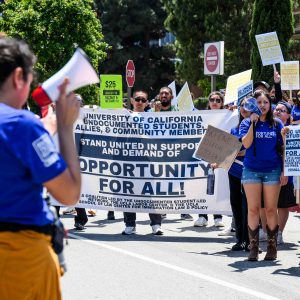
In 2011, the Pew Research Center reported that 64% of the silent generation believed that the U.S. is the greatest country in the world, while only 32% of the millennial generation shared the same opinion. This generational divide over American exceptionalism has been brought to light, especially in recent months. On March 5, by a vote of 6 to 4, the the UC Irvine Legislative Council passed a resolution banning the display of any and all flags in the lobby area of student government offices. The resolution claimed that “the American flag has been flown in instances of colonialism and imperialism” and that the student government offices should aim to be “inclusive” and that “freedom of speech, in a space that aims to be as inclusive as possible, can be interpreted as hate speech.”
This decision, which was promptly vetoed by the student government’s executive board on March 7, has sparked backlash across the country. The uproar was so intense that UC Irvine’s chancellor, Howard Gillman, was forced to defend the school and, in the process, denounced his own students. “It was outrageous and indefensible that they would question the appropriateness of displaying the American flag on this great campus,” wrote Gillman.
Within hours after the story broke, social media was buzzing with racist and threatening comments directed towards the six individuals on the student government who supported the legislation. They were villainized, their names were circulated online, and many angry posts suggested that the students in question deserved to be expelled and even deported. Many activists, both wearing and bearing flags, also came to campus to personally express their outrage.
From a broader perspective, the uproar surrounding the flag ban controversy is indicative of a shift in contemporary politics. There is clearly nothing offensive or, indeed, inspiring about the red, white, and blue geometric shapes the American flag is comprised of. As such, the flag, itself, cannot be controversial. Instead, the controversy arises from the sharp differences in connotations that the American flag has come to symbolize. Where one sees courage, sacrifice, and freedom, another sees nationalism, imperialism, and oppression. This divide has grown larger as each passing generation has adopted an increasingly progressive ideology and it has become especially prevalent in California, one of the most liberal states in the union.
The flag fiasco at UCI has even begun to affect legislation in California. On March 9, Senator Janet Nguyen, a UCI alumna, proposed a constitutional amendment that would effectively prohibit flag banning at California’s publicly funded institutions of higher learning. The proposal, which has been supported by Senate Republican leader Robert Huff and the new Assembly minority leader Kristin Olsen, could take the form of a measure in front of voters in the November 2016 elections.
“I came to this country as an immigrant searching for freedom and democracy and I would not be here today if it were not for the American flag,” said Senator Nguyen. “The veterans that are with us here today and the thousands of servicemen and women fighting throughout the world deserve for us to make every effort to ensure that the American flag is proudly displayed at public universities and colleges throughout California. That is why we have introduced this Senate Constitutional Amendment.”
The effectiveness of this proposed legislation has been called into question, leading some to suggest that Senator Nguyen’s proposal is nothing more than an attempt to gain some quick political capital. In response to the proposed amendment, UC Berkeley Political Science Professor Darren Zook has suggested an alternative approach. He explains, “I can pull a book off my shelf. I’ll read it one way, you’ll read it another – but we both actually have to read it. We have to have an understanding of what it is that makes it controversial. We should not censor that book and we should not ban the American flag. The issue should be talked out until people understand why the flag should stay.”
In 1989, the Supreme Court ruled that flag burning is symbolic speech that is protected by the First Amendment. They wrote that, “The way to preserve the flag’s special role is not to punish those who feel differently about these matters. It is to persuade them that they are wrong.” These words are especially applicable to today’s concerns.
With a broader perspective, it would seem that UC Irvine’s flag controversy is not a question of whether the actions of a handful of student were correct or incorrect. They were not correct because the very notion of banning the physical representation of American freedom is clearly absurd. The decision to ban the American flag should not be left up to students – and, ultimately, public outcry was a sufficient deterrent – but what matters here is not the decision itself but the “why” behind it. This controversy implies a shift in ideology among the millennial generation. Compared with earlier generations, there is a growing wariness of nationalism on campuses across the United States. This generation of students will not blindly accept the symbol of American greatness without an understanding of the questionable actions that have made it so and this trend will continue to inform how young people think and act in the public sphere.




